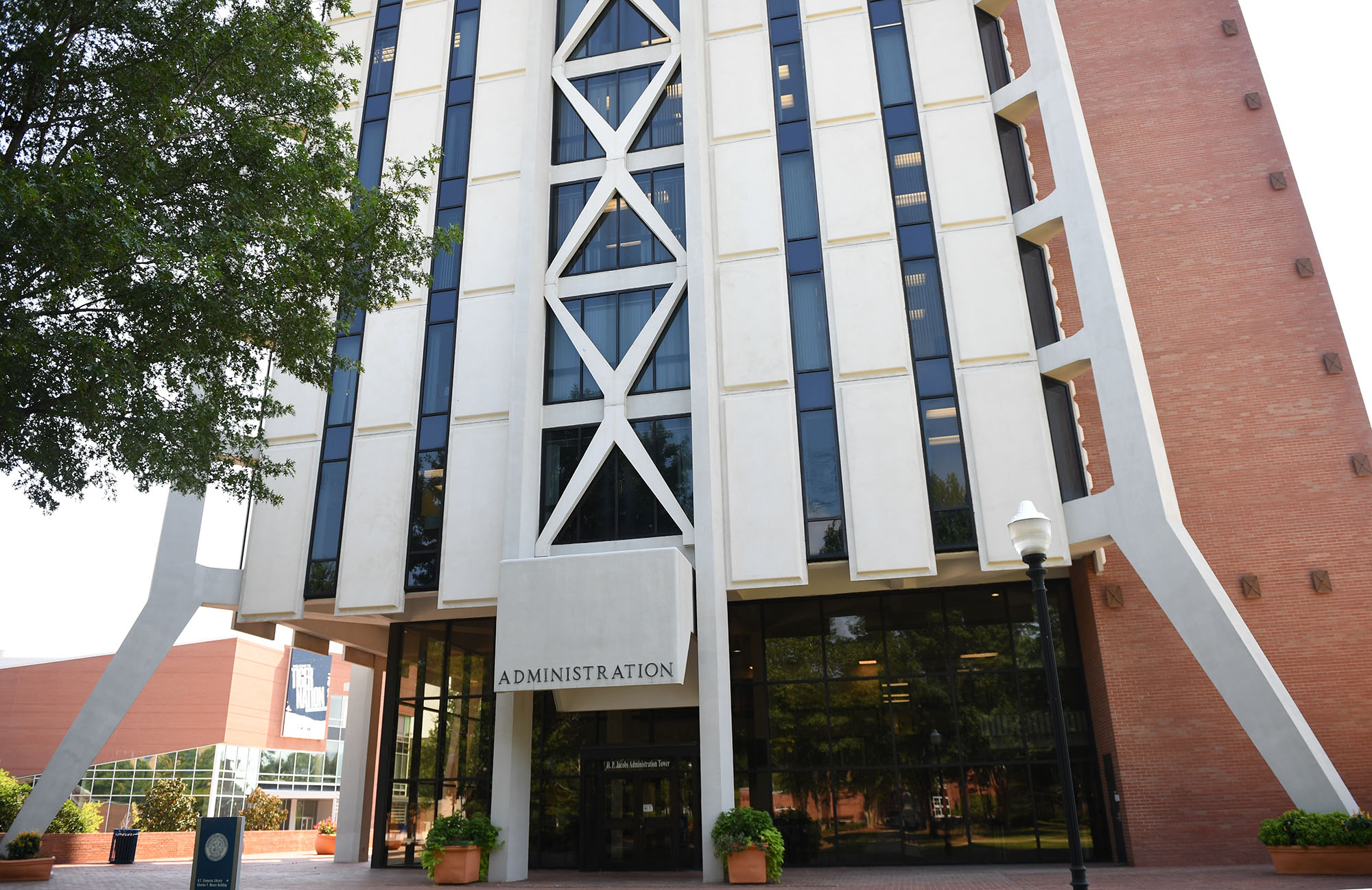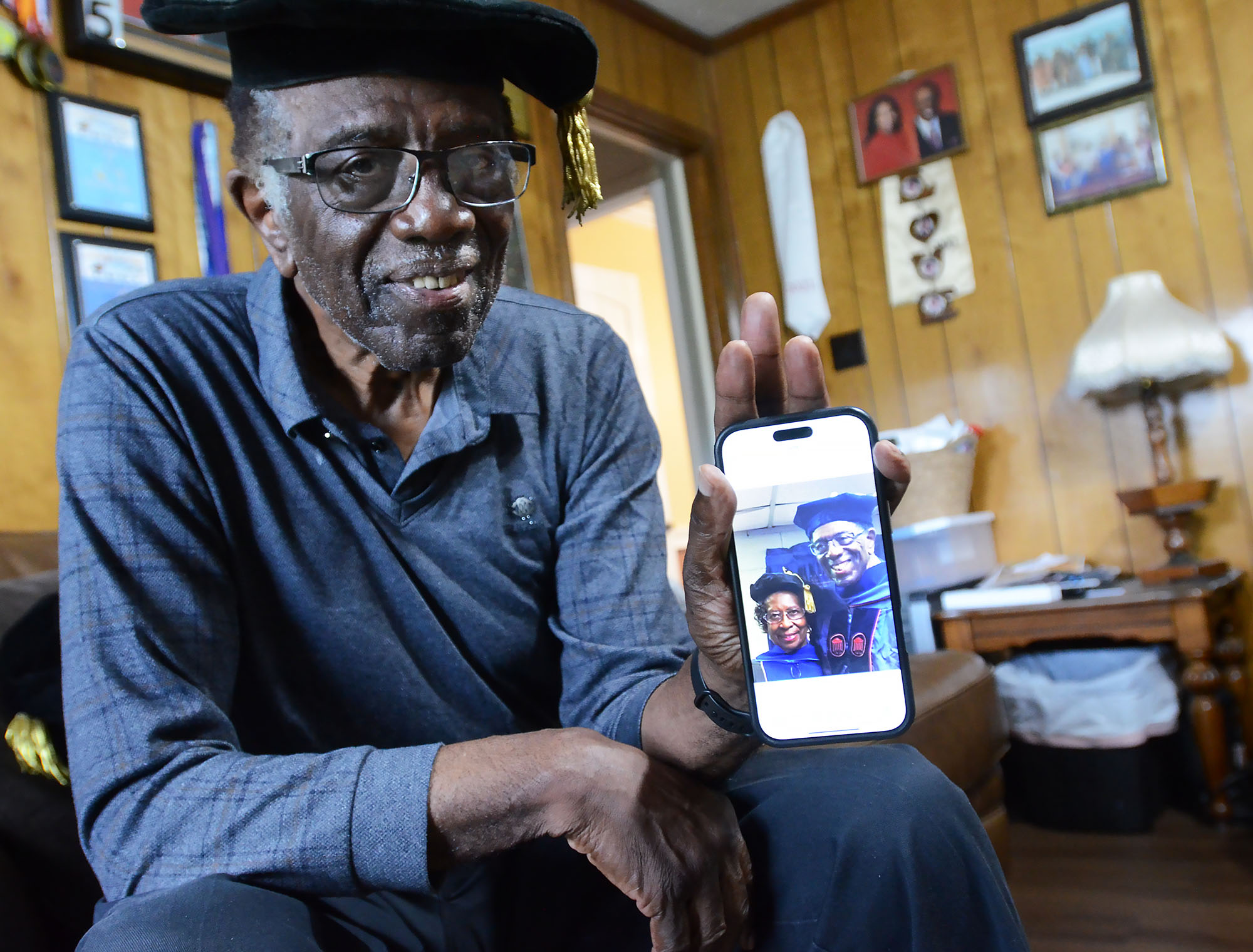Mississippi Today
Veteran journalist Emily Wagster Pettus joins Mississippi Today
We are thrilled to announce that veteran journalist Emily Wagster Pettus has joined Mississippi Today as our senior editor.
Emily brings more than three decades of experience covering Mississippi. She joins the newsroom’s leadership team to help guide our editorial strategy, mentor young reporters and grow our relationship with newsroom leaders across the state and region.
The dean of the Mississippi Capitol Press Corps, Emily served as The Associated Press’s Mississippi Capitol correspondent from 2001 until January 2025. She previously reported for The Clarion-Ledger, The Vicksburg Evening Post and The Oxford Eagle. She is a graduate of the University of Mississippi.
“Emily is, in so many ways, a trailblazer for Mississippi journalists,” said Adam Ganucheau, Mississippi Today’s editor-in-chief. “Her steadfast, tough-but-fair reporting has inspired many journalists — myself included — to serve Mississippians in similar ways. I can’t overstate how excited we are to have her join our newsroom, where her insight and perspective will be invaluable to us and will help shape our future. And, of course, everyone is thrilled about the return of Emily’s byline after a few months of well-deserved rest.”
Emily’s reporting has been widely praised for its fairness, accuracy and depth. In March 2025, the Mississippi Legislature honored her with a resolution recognizing her contributions to journalism and public understanding. She is also a past recipient of the University of Mississippi’s prestigious Silver Em Award.
“I’m looking forward to working with smart, energetic journalists at Mississippi Today, many of whom are friends and former colleagues,” Emily said. “It’s important to report with depth and historical perspective on the complex issues of this state and to demand accountability from public officials, elected and appointed.”
Emily can be reached at epettus@mississippitoday.org.
This article first appeared on Mississippi Today and is republished here under a Creative Commons Attribution-NoDerivatives 4.0 International License.
The post Veteran journalist Emily Wagster Pettus joins Mississippi Today appeared first on mississippitoday.org
Mississippi Today
Bluesky blocks access in Mississippi, citing free speech and privacy concerns over state law
Mississippians can no longer access the Bluesky app after the social media platform blocked access to users in the state.
Bluesky said on Friday that it made the decision after the U.S. Supreme Court declined for now to block a Mississippi state law that the platform said limits free expression, invades people’s privacy and unfairly targets smaller social media companies. The state law, passed in 2024, requires users of websites and other digital services to verify their age.
“The Supreme Court’s recent decision leaves us facing a hard reality: comply with Mississippi’s age assurance law—and make every Mississippi Bluesky user hand over sensitive personal information and undergo age checks to access the site—or risk massive fines,” the company wrote in a statement. “The law would also require us to identify and track which users are children, unlike our approach in other regions. We think this law creates challenges that go beyond its child safety goals, and creates significant barriers that limit free speech and disproportionately harm smaller platforms and emerging technologies.”
Mississippi Attorney General Lynn Fitch, whose office defended the law, told the justices that age verification could help protect young people from “sexual abuse, trafficking, physical violence, sextortion and more,” activities that the First Amendment does not protect.
The age verification law added Mississippi to a list of Republican-led states where similar legal challenges are playing out.
NetChoice is challenging laws passed in Mississippi and other states that require social media users to verify their ages, and asked the Supreme Court to keep the measure on hold while a lawsuit plays out.
That came after a federal judge prevented the 2024 law from taking effect. But a three-judge panel of the 5th Circuit U.S. Court of Appeals ruled in July that the law could be enforced while the lawsuit proceeds.
On Aug. 14, the Supreme Court rejected an emergency appeal from a tech industry group representing major platforms such as Facebook, X and YouTube.
There were no noted dissents from the brief, unsigned order. Justice Brett Kavanaugh wrote that there’s a good chance NetChoice will eventually succeed in showing that the law is unconstitutional, but hadn’t shown it must be blocked while the lawsuit unfolds.
Bluesky grew after the 2024 presidential election. Many users of X, which is owned by Elon Musk, retreated from the platform in response to the billionaire’s strong support of Donald Trump.
In Bluesky’s statement explaining its decision to block access in Mississippi, the company said age verification systems “require substantial infrastructure and developer time investments, complex privacy protections, and ongoing compliance monitoring — costs that can easily overwhelm smaller providers.”
“This dynamic entrenches existing big tech platforms while stifling the innovation and competition that benefits users,” the company added.
Bluesky said it did follow other digital safety regulations, such as the United Kingdom’s Online Safety Act. Under that statute, age checks are required only for accessing certain content and features, and Bluesky does not track which users are under 18, the platform said:
“Mississippi’s law, by contrast, would block everyone from accessing the site—teens and adults—unless they hand over sensitive information, and once they do, the law in Mississippi requires Bluesky to keep track of which users are children.”
The Mississippi law, authored by Rep. Jill Ford, a Republican from Madison, is called the “Walker Montgomery Protecting Children Online Act,” named after a Mississippi teen who reportedly committed suicide after an overseas online predator threatened to blackmail him.
The Associated Press contributed to this report
This article first appeared on Mississippi Today and is republished here under a Creative Commons Attribution-NoDerivatives 4.0 International License.
The post Bluesky blocks access in Mississippi, citing free speech and privacy concerns over state law appeared first on mississippitoday.org
Note: The following A.I. based commentary is not part of the original article, reproduced above, but is offered in the hopes that it will promote greater media literacy and critical thinking, by making any potential bias more visible to the reader –Staff Editor.
Political Bias Rating: Center-Left
The content presents a perspective that emphasizes concerns about free speech, privacy, and the impact of government regulation on smaller tech companies, which aligns with a more progressive or liberal viewpoint on digital rights and corporate regulation. It critiques a Republican-led state law as potentially overreaching and harmful to innovation, while also acknowledging the law’s intent to protect children. The balanced presentation of both sides, with a slight emphasis on the tech platform’s viewpoint and civil liberties, suggests a center-left bias.
Mississippi Today
Golden Triangle development group gets new home ‘in the middle of the kingdom’ it built
COLUMBUS — The Golden Triangle’s new headquarters for economic development has opened in the middle of the massive projects it has helped bring to Clay, Lowndes and Oktibbeha counties.
The $2.5-billion Steel Dynamics aluminum mill is visible from one window and the airport from another. Just down the road are the Airbus factory that has built 1,700 helicopters, the 400-acre PACCAR site that churns out engines and Stark Aerospace, which was awarded a $61-million defense contract last year. These are companies that Joe Max Higgins and his team have helped bring to the area.
“It’s in the middle of the kingdom,” said Higgins, the CEO of Golden Triangle Development LINK. “I mean, you can just look. It’s all here. You can just walk around and see everything.”
READ MORE: Mississippi Marketplace: Another data center on the way
The headquarters was previously located on Main Street in Columbus. But Higgins said that the agency has wanted to move to a more central location for a while. The new headquarters sits on land owned by the Golden Triangle Regional Airport, which is run by all three counties.
LINK is the regional economic development organization for the three-county area known as the Golden Triangle. It is funded by the three county governments and private backers. This melding of public and private interests was represented at Tuesday’s opening event by the attendance of public officials and business leaders.
The event honored Bobby Harper, a former member of the board of directors, who was instrumental in acquiring private funders to support the organization.
“We could not be here today without Bobby’s work,” Higgins said at the opening ceremony.
The three counties now work together on economic development, but it wasn’t that way when Higgins started. At first he was just working for Lowndes County.
READ MORE: What is Steel Dynamics, the Fortune 500 company that lawmakers gave $247M?
“I was real slow to embrace the regionalism stuff. I just always believed that the only way you win is to tear everybody’s face off,” said Higgins. “That’s still true, but I will tell you that once we put the three counties together, I found out that I had more bullets for a gun, more resources, more places for people to live, more opportunities and more money.”
Higgins is legendary for his economic development efforts, even outside of Mississippi. He’s been negotiating deals for the Golden Triangle since he was recruited from Arkansas in 2003. Since then his team has brought in over $10 billion in capital investment and over 10,000 jobs.
In the process, Higgins has developed a national profile for bringing in manufacturing jobs to the region. This has included profiles on 60 Minutes and in The Atlantic.
Even as more manufacturing moved out of the U.S., the Golden Triangle has continued to invest in manufacturing. And it’s not slowing down.
The group is working on finding a company for its fifth “megasite,” a 1,400-acre piece of land that can accommodate a large scale industrial operation. The organization recently announced a $90-million aluminum processing facility is in the works close to their new headquarters.
“The guy that grabs a hold on a tiger. The tiger starts running. What do you do?” Higgins responded when asked what the next 20 years of development in the Golden Triangle would look like. “Do you let go and the tiger eats you up, or hang on and you don’t know where you’re gonna end up? I think you hang on, and so I think that’s what we’re gonna do.”
This article first appeared on Mississippi Today and is republished here under a Creative Commons Attribution-NoDerivatives 4.0 International License.
The post Golden Triangle development group gets new home ‘in the middle of the kingdom’ it built appeared first on mississippitoday.org
Note: The following A.I. based commentary is not part of the original article, reproduced above, but is offered in the hopes that it will promote greater media literacy and critical thinking, by making any potential bias more visible to the reader –Staff Editor.
Political Bias Rating: Center-Right
This article focuses on economic development and manufacturing growth in a regional area, highlighting the efforts of business leaders and public-private partnerships. It emphasizes job creation, investment, and industrial expansion, themes commonly associated with pro-business, market-oriented perspectives. The tone is positive about economic development initiatives without critique of potential social or environmental impacts, aligning it with a center-right viewpoint that values economic growth and private sector involvement in regional development.
Mississippi Today
Lackey family members show value of education
As children during the 1950s, Hilliard Lackey and Lillian Troupe often had to skip school to pick cotton with their sharecropping parents.
They grew up together in the small north Mississippi town of Marks, both raised by devoutly Christian families.
Marks has struggled with poverty for generations, and problems were compounded by Mississippi’s history of underfunding public education for Black students. Schools remained segregated, and both said it was common for Black children around them to drop out or miss school so they could work in the fields.
“That was the life we knew, the life we inherited,” Hilliard Lackey said.
Hilliard and Lillian met as classmates in sixth grade, started dating in high school and married in 1966. Despite the challenges of the time, their parents and church leaders encouraged them to be ambitious and succeed.
Today, several members of the Lackey family have doctoral degrees: Hilliard and Lillian Lackey; their daughters, Tahirih Lackey and Dr. Katrina Davis; the couple’s daughter-in-law, Tracy Knight Lackey; and his stepbrother and sister-in-law, Dr. Robert Long and Vanessa Rogers Long.

Pew Research Center found that as of 2023, about 26% of all Black Americans 25 and older have a bachelor’s degree or higher, and 11% have advanced degrees. In Mississippi, 18.5% of Black residents have a bachelor’s degree or higher.
Hilliard Lackey is a longtime professor of urban higher education and lifelong learning at Jackson State University. He attended what was then called Jackson State College, earning his bachelor’s in history and political science, pre-law track, in 1965. (It became Jackson State University in 1974.)
Hilliard Lackey – who later earned a master’s degree in educational administration, an education specialist degree in the same topic, and a doctorate in higher education administration – was the first in his family to go to college.
“I left home and came to a whole new city, a whole new environment. It’s a college,” he said, looking back on the experience. “And I was astounded, and scared, and frightened and bewildered.”

Lillian, then still named Troupe, attended Coahoma Community College before transferring to what was then called Alcorn Agricultural and Mechanical College – since 1974, Alcorn State University. She graduated from Alcorn with a bachelor’s in business education in 1966 and earned a masters in education administration from Jackson State in 1974.
She was still living and working in Marks during community college.
“I went to Coahoma … rode the school bus, came home, got out of my clothes, went to the field, picked cotton,” she said. “And so I picked my way out of the cotton field to Alcorn.”

In June, West Coast Bible College & Seminary awarded Lillian Lackey an honorary doctorate for her years of community service.
Two of Hilliard and Lillian Lackey’s four children have doctorates. Davis has a medical degree and is a urogynecologist. Tahirih Lackey has a doctorate in civil environmental engineering and is a research hydraulic engineer at the U.S. Army Corps of Engineers Research and Development Center.

Both sisters say their parents’ emphasis on education and success and their religious faith influenced their career paths.
Davis recounted that every Sunday, each member of the family stood in front of the fireplace and discussed what they’d done that week to achieve their goals. She and her siblings attended a variety of academic and athletic summer programs before and during college.
Hilliard and Lillian Lackey converted from Christianity to the Baha’i faith as adults. They raised their children “essentially as Christian Baha’is,” according to Hilliard Lackey, and let them choose what religion to follow when they were 15 years old.
“They pretty much told us, ‘Whatever you want to be, you can be, and we’ll be there to help you,’” Davis said.
“I would recognize that my parents, they were always helping other people. Like, throughout my whole life they demonstrated those concepts,” Tahirih Lackey said.

“None of us thought we had any barriers,” Davis said. “If there were barriers, they were from our own mental blocks.”
Hilliard Lackey’s stepbrother, Dr. Robert Long, is a dentist in Clarksdale. Long also credits his upbringing for his success, saying his parents raised him and his siblings with a strong work ethic and Christian values.
“They instilled in us that nobody is going to give you anything, nobody is obligated to give you anything,” Long said.
Long grew up in a small rural town in Quitman County, 15 miles from Marks. He had a similar upbringing to Hilliard Lackey. His parents encouraged him to get an education.
He attended Earlham College, where he majored in biology and found a mentor who inspired him to become a dentist.
He described his undergraduate experience as a “culture shock” and an “academic shock.” He chose to persevere through the challenges.
“I knew I could go home,” he said, “but I didn’t want to go home.”

Vanessa Rogers Long grew up in a middle-class family in the small community of Memphis, Mississippi, and, like most of her family, has lived a life dedicated to service.
She was the first Black hospital administrator for the Mississippi Department of Corrections. She founded Mississippi Delta Connection, which is part of Links Inc. She also mentors teens on service and leadership skills. She has received several honors, including having her sorority, Alpha Kappa Alpha, dedicate a bench to her at her alma mater, LeMoyne-Owen College.
“Service is what I do,” she said.
Hilliard and Lillian Lackey are also deeply involved in community service, including their “Lackey Scholars” program inspired by a former teacher. Hillard Lackey estimates they’ve helped more than 500 high school students from Quitman County attend and graduate from Jackson State since 1967. In addition, they mentor dozens of students from Quitman County’s Madison Shannon Palmer High School to act as role models for their peers and the community.

“That’s just been our thing, it’s always been,” Lillian Lackey said. “To help somebody, if they were hungry, if they were cold, if they were whatever.”
When asked what he would tell first-generation college students, Hilliard Lackey said: “Education is an equalizer. It gives an advantage to the disadvantaged. It levels the legacy playing field.”

This article first appeared on Mississippi Today and is republished here under a Creative Commons Attribution-NoDerivatives 4.0 International License.
The post Lackey family members show value of education appeared first on mississippitoday.org
Note: The following A.I. based commentary is not part of the original article, reproduced above, but is offered in the hopes that it will promote greater media literacy and critical thinking, by making any potential bias more visible to the reader –Staff Editor.
Political Bias Rating: Center-Left
This article emphasizes the value of education, community service, and overcoming historical racial and economic challenges, themes often highlighted in center-left discourse. It acknowledges systemic issues like underfunding of Black education in Mississippi while focusing on personal achievement and community upliftment without overt political partisanship. The tone is positive and supportive of education as a tool for social mobility, aligning with moderate progressive values but avoiding strong ideological language.
-
News from the South - Kentucky News Feed6 days ago
First of its kind clinical trial offers new hope for Kentuckians at risk of dementia
-
News from the South - Arkansas News Feed7 days ago
Cities across the US are embracing AI guidelines for local government workers
-
News from the South - Alabama News Feed6 days ago
Grants to boost local emergency alert systems in question as public media agency closes
-
Our Mississippi Home6 days ago
MSU Unveils Mixed-Use Development Featuring Boutique Hotel, Cultural Landmark
-
News from the South - Arkansas News Feed6 days ago
‘Alligator Alcatraz’ probed by Dems as ICE detention centers multiply in states
-
News from the South - Arkansas News Feed5 days ago
New I-55 bridge between Arkansas, Tennessee named after region’s three ‘Kings’
-
News from the South - West Virginia News Feed6 days ago
WV groups call on Morrisey, McCuskey to push against end of federal solar program
-
News from the South - Texas News Feed3 days ago
DEA agents uncover 'torture chamber,' buried drugs and bones at Kentucky home











































